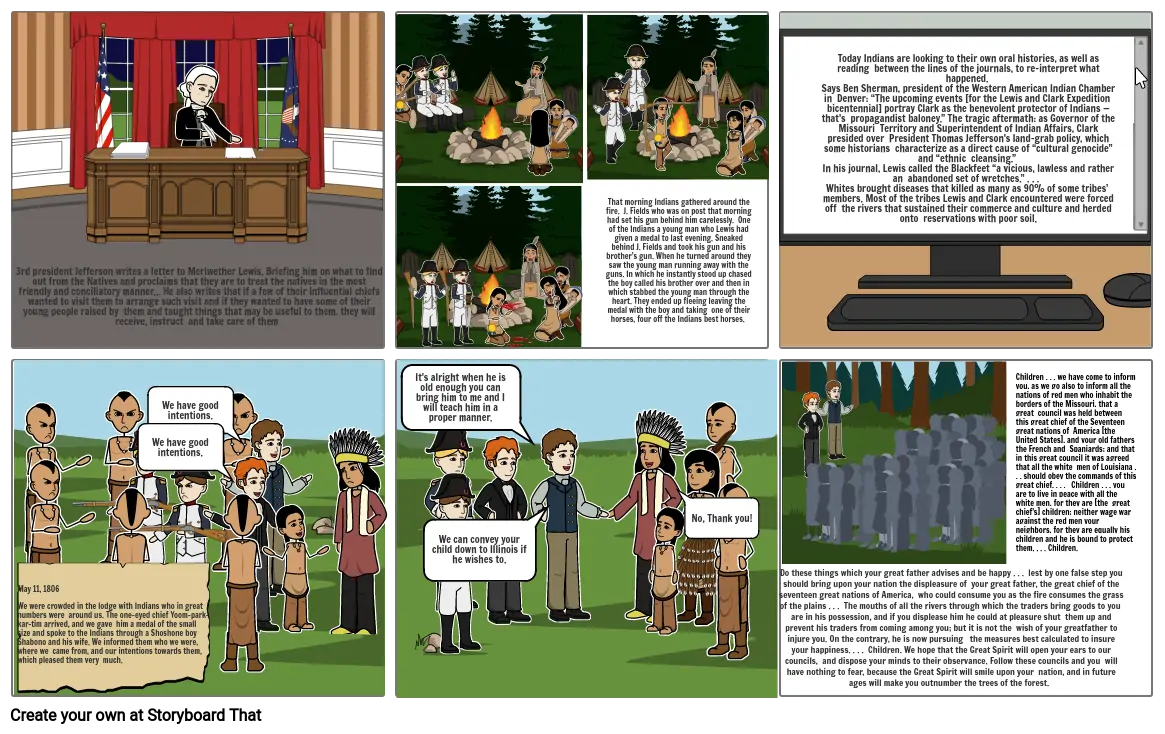Lewis and Clark Treat Natives Stan Storyboard

Storyboard Text
- 3rd president Jefferson writes a letter to Meriwether Lewis. Briefing him on what to find out from the Natives and proclaims that they are to treat the natives in the most friendly and conciliatory manner... He also writes that if a few of their influential chiefs wanted to visit them to arrange such visit and if they wanted to have some of their young people raised by them and taught things that may be useful to them, they will receive, instruct and take care of them
-
-
- That morning Indians gathered around the fire. J. Fields who was on post that morning had set his gun behind him carelessly. One of the Indians a young man who Lewis had given a medal to last evening. Sneaked behind J. Fields and took his gun and his brother’s gun. When he turned around they saw the young man running away with the guns. In which he instantly stood up chased the boy called his brother over and then in which stabbed the young man through the heart. They ended up fleeing leaving the medal with the boy and taking one of their horses, four off the Indians best horses.
-
- Today Indians are looking to their own oral histories, as well as reading between the lines of the journals, to re-interpret what happened. Says Ben Sherman, president of the Western American Indian Chamber in Denver: “The upcoming events [for the Lewis and Clark Expedition bicentennial] portray Clark as the benevolent protector of Indians — that's propagandist baloney.” The tragic aftermath: as Governor of the Missouri Territory and Superintendent of Indian Affairs, Clark presided over President Thomas Jefferson's land-grab policy, which some historians characterize as a direct cause of “cultural genocide” and “ethnic cleansing.” In his journal, Lewis called the Blackfeet “a vicious, lawless and rather an abandoned set of wretches.” . . . Whites brought diseases that killed as many as 90% of some tribes’ members. Most of the tribes Lewis and Clark encountered were forced off the rivers that sustained their commerce and culture and herded onto reservations with poor soil.
- May 11, 1806We were crowded in the lodge with Indians who in great numbers were around us. The one-eyed chief Yoom-park-kar-tim arrived, and we gave him a medal of the small size and spoke to the Indians through a Shoshone boy Shabono and his wife. We informed them who we were, where we came from, and our intentions towards them, which pleased them very much.
- We have good intentions.
- We have good intentions.
- It's alright when he is old enough you can bring him to me and I will teach him in a proper manner.
- We can convey your child down to Illinois if he wishes to.
- No, Thank you!
- Do these things which your great father advises and be happy . . . lest by one false step you should bring upon your nation the displeasure of your great father, the great chief of the seventeen great nations of America, who could consume you as the fire consumes the grass of the plains . . . The mouths of all the rivers through which the traders bring goods to you are in his possession, and if you displease him he could at pleasure shut them up and prevent his traders from coming among you; but it is not the wish of your greatfather to injure you. On the contrary, he is now pursuing the measures best calculated to insure your happiness. . . . Children. We hope that the Great Spirit will open your ears to our councils, and dispose your minds to their observance. Follow these councils and you will have nothing to fear, because the Great Spirit will smile upon your nation, and in future ages will make you outnumber the trees of the forest.
- Children . . . we have come to inform you, as we go also to inform all the nations of red men who inhabit the borders of the Missouri, that a great council was held between this great chief of the Seventeen great nations of America [the United States], and your old fathers the French and Spaniards; and that in this great council it was agreed that all the white men of Louisiana . . . should obey the commands of this great chief. . . . Children . . . you are to live in peace with all the white men, for they are [the great chief’s] children; neither wage war against the red men your neighbors, for they are equally his children and he is bound to protect them. . . . Children.
Over 30 Million Storyboards Created

